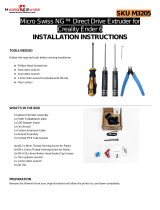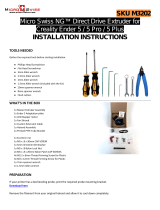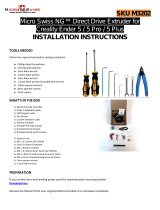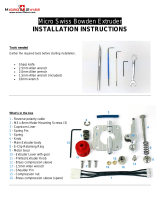Page is loading ...

Home » MICRO SWISS » MICRO SWISS M3204 Direct Drive Extruder for Creality Ender 5 Linear Rail Edition
Instruction Manual
MICRO SWISS M3204 Direct Drive Extruder for Creality Ender 5 Linear Rail Edition
MICRO SWISS M3204 Direct Drive Extruder for Creality Ender
5 Linear Rail Edition Instruction Manual
Manuals+ — User Manuals Simplified.

Phillips-Head Screwdriver
3mm Allen wrench
2mm Allen wrench
1.5mm Allen wrench (included with kit)
Flush cutters
WHAT’S IN THE BOX
1x Master Extruder Assembly

1x Adaptation plate
1x Stepper motor
1x Fan Shroud
1x Custom extension cable
1x Hotend assembly
1x Printed Bracket
Hardware:
4x M3 x .5 x 6mm Flat Head Cap Screws
4x M2.2 x 8mm Thread Forming Screw for Plastic
4x M3 x 12mm Thread Forming Screw for Plastic
1x 7mm spanner wrench.
1x 1.5mm Allen wrench
5x Zip Ties
PREPARATION
If your printer has a bed leveling probe, print the required probe mounting bracket for the NG Extruder.
Download here
Remove the filament from your original hotend and allow it to cool down completely.
Disassemble and remove the original print head
Install your own MGN12 Linear Rail with the MGN12H Carriage Block to the top of the printers X-axis
aluminum
extrusion using at least two M3 T-nuts and M3x8mm screws.
Step 1 – SAFETY
For your safety, turn off and unplug your printer.
Step 2 – UNFASTEN THE FAN SHROUD

Detach the fan shroud from the extruder assembly by removing the two screws using a 2mm Allen wrench
Step 3 – ATTACH THE EXTRUDER TO THE LINEAR RAIL CARRIAGE
Attach the Extruder assembly to your MGN12 Carriage Block using the provided M3 x .5 x 6mm Flat Head
Cap screws
Step 4 – ATTACH THE BELT

Clip the X-axis belt into the two slots at the bottom of the Linear Rail Adaptation Plate
Tighten the X-axis belt
Step 5 – PREPARE THE HOTEND
Remove the silicone sock from the all metal hotend The included hotend has already been preheated and the
nozzle has been tightened to spec at the factory.
There is no need to do the nozzle tightening procedure on the new hotend unless you are replacing the nozzle.
When replacing nozzles in the future, the hotend will need to be preheated to exactly 220C and the new nozzle
should be torqued to 30-inch pounds. The thermal break needs to be fully seated before the nozzle is tightened

down
Step 6 – INSTLL THE HOTEND
Insert the hotend assembly into the extruder Verify the thermal break is seated as deep as possible in the
extruder (compare with reference image on the left)
Tighten the grub screw using a 1.5mm Allen wrench
Step 7 – INSTALL THE THERMISTOR AND HEATER CARTRIDGE

Install the heater cartridge and the thermistor
Secure the thermistor wires in place using the Phillips head screw Be careful not to overtighten the Phillips
head screw as this can damage delicate wires Make sure the thermistor sits all the way inside the thermistor
hole. The glass bead of the thermistor should not be visible from the outside.
Tighten the two heater cartridge screws using the 1.5mm Allen wrench
Step 8 – INSTALL THE SILICONE SOCK

Install the silicone sock
Step 9 – ATTACH THE FANS TO THE FAN SHROUD

Install the part cooling fan onto the fan shroud using the smaller of the four provided self tapping screws
Install the hotend cooling fan onto the fan shroud using the larger of the four provided self-tapping screws
Step 10 – INSTALL THE FAN SHROUD

Install the assembled fan shroud back on the extruder
Step 11 – INSTALL THE FILAMENT GUIDE BRACKET
Install the filament guide bracket where the original Bowden extruder used to sit, using provided M3 nuts and
bolts.
Step 12 – INSTALL THE FILAMENT GUIDE TUBE

The printers original Bowden tube will be reused to help guide filament from the spool into the Extruder
Insert the filament guide tube into the Filament Guide Bracket and secure it using one of the provided retaining
clips.
Insert the other end of the filament guide tube into the top of the Extruder and secure it using one of the
provided retaining clips.
Step 13 – INSTALL THE EXTENSION CABLE

It is very important to use the provided extension cable.
This cable has a special pinout for the NG Extruder’s LDO motor.
Connect on end of the extension cable to the original E cable and the other end to the LDO stepper motor
Make sure to give the extension cable some slack near the stepper motor
ENDSTOP SWITCH (ENDER 5 PLUS ONLY)

The Ender 5 Plus requires the X-axis endstop switch to be installed onto the provided bracket. This will prevent
the NG fan shroud from touching the gantry wheel when Auto Homing the printer.
(Only use this bracket on the Ender 5 Plus, it is not needed on the Ender 5 or Ender 5 Pro)
Unfasten the X-axis endstop switch
Remove the stock endstop bracket
Install provided endstop bracket
Reinstall the x-axis endstop switch
Step 14 – CABLE MANAGEMENT

Use provided zip ties to managed your cables neatly
Step 15 – ADJUST THE GEAR TENSION
djust the gear tension by rotating the brass knob The gear tension can be gauged by measuring how much of
the brass knob’s threads are exposed. (Distance from the head of the brass knob to the aluminum extruder
arm.)
The good starting point for stiff filaments such as PLA, PTEG, ABS is 1.75mm of exposed threads (use a piece
of 1.75mm filament as a gauge as shown in the image on the left) For flexible filaments such as TPU, loosen

the knob until about 2.75mm of the threads are exposed. (Loosen the knob two full turns, if starting from
1.75mm)
Step 16 – POWER ON THE PRINTER
Plug the power cable in and turn the printer on
Step 17 – UPDATE E-STEPS

The E-steps will need to be set to 400 in the printer settings.
Download the Esteps G-code
Copy the Esteps G-code file onto your Micro CD card
“Print” the Esteps G-code using the printer menus, as you would with a regular G-code that was made using a
slicer.
Some printers will save the printer settings to a file on the MicroSD card.
For those printers, the MicroSD card has to be inside of the printer when the printer is being turned on,
otherwise the new settings will not be loaded.
Step 18 – CONFIGURE SLICER SETTINGS

Set the Retraction Distance to 1.0mm in your slicer software Maximum Retraction Distance: 1.5mm
Do not use any gcodes that were sliced with a Retraction Distance higher than 1.5mm.
Service Tips
Removing Filament
Preheat the hotend to printing temperature
Press the extruder arm to release the gear tension
Purge the nozzle by manually pushing the filament down about 10mm to extrude any melted plastic
Quickly pull the filament out of the extruder
Loading Filament
Preheat the hotend to printing temperature
Cut the tip of the filament at a 45-degree angle
Straighten the tip of the filament out
Using the printer menus issue an Extrude command
Insert the filament into the extruder as the gears are rotating
When loading filament initially do not press the extruder arm until after the filament has made it into the tube below
the extruder gears. After that you can then either continue to issue more Extrude commands using the printer
menu or press the extruder arm back and push the filament down manually until you see melted filament coming
out of the hot nozzle
Nozzle Replacement Procedure

Preheat the hotend to exactly 220C
Remove the filament from the hotend
Unscrew the old nozzle, while holding the heater block in position using an
adjustable wrench
Screw in the new MK8 nozzle and torque it to 30-inch pounds, while holding the heater block in position using
an adjustable wrench Verify that the thermal break is still seated flush on top of the heater block after
installation
Copyright © 2022 Micro Swiss LLC. All rights reserved
Documents / Resources
MICRO SWISS M3204 Direct Drive Extruder for Creality Ender 5 Linear Rail Edition [pdf] I
nstruction Manual
M3204 Direct Drive Extruder for Creality Ender 5 Linear Rail Edition, M3204, Direct Drive Extru
der for Creality Ender 5 Linear Rail Edition, Direct Drive Extruder, Drive Extruder, Extruder
References
Micro Swiss Ender-5 NG Extruder - Probe Brackets and Fan Shroud by MicroSwiss - Thingiverse
Manuals+,
/





